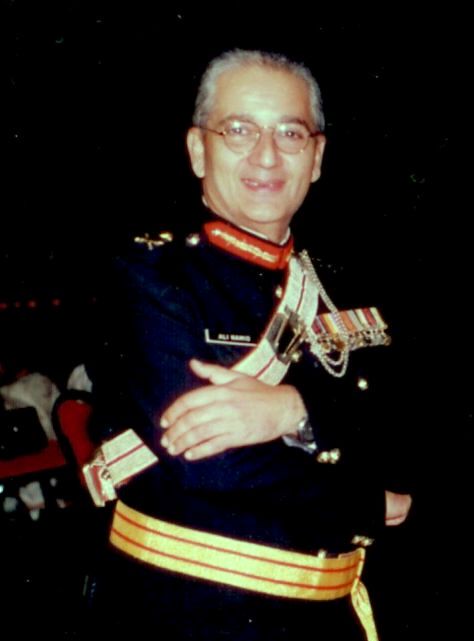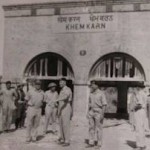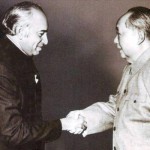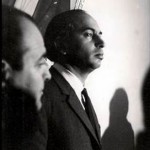A PAGE FROM HISTORY
HOME TRUTHS OF THE 1965 WAR
By Maj Gen (Retd) Syed Ali Hamid

Maj Gen (Retd) Syed Ali Hamid Pakistan Army
Maj Gen (Retd) Syed Ali Hamid was posted to 26 Cavalry on his commissioning in 1968. He served with the regiment during the Chhamb Operations and was the first original officer who commanded the regiment from 1982-84. The officer is a graduate of Staff College Camberley, and served as an instructor at Staff College Quetta and National Defence College. As a General Officer, he commanded a Mechanized Division and established the Defence Export Promotion Organization.
 A month after the skirmish in the Rann of Kutch, at a dinner in the Signal Officer’s Mess Bhutto broached the subject of war with my father. “General Shahid. Sir” (Till he was in Ayub Khan’s cabinet he was always very respectful to my father). “Don’t you think it is time we attacked India?” My father, who had served in Burma during the Second World War and had been injured, firmly replied, “Zulfi. Have you ever heard a shot fired in anger? In war there is no victor and no vanquished. Everyone suffers. Why should we go to war? The country and the economy are doing so well. I think it’s a very bad idea.”
A month after the skirmish in the Rann of Kutch, at a dinner in the Signal Officer’s Mess Bhutto broached the subject of war with my father. “General Shahid. Sir” (Till he was in Ayub Khan’s cabinet he was always very respectful to my father). “Don’t you think it is time we attacked India?” My father, who had served in Burma during the Second World War and had been injured, firmly replied, “Zulfi. Have you ever heard a shot fired in anger? In war there is no victor and no vanquished. Everyone suffers. Why should we go to war? The country and the economy are doing so well. I think it’s a very bad idea.”
“But your Generals think so,” retorted Bhutto to which my father now visibly annoyed replied “Well they are talking out of their hat”.
Ardeshir Cowasjee the famous journalist (and may his soul rest in peace) once wrote that Bhutto never did or said something without a reason behind it. Bhutto knew that my father was a close friend of the Field Marshall and if he had supported the idea then Bhutto would have asked him to ‘put in a word’. There is sufficient evidence to substantiate the fact that the FM was reluctant to go to war. After the conflict he told my father, “Shahid. These people pushed me into the War”. Who were these people that the FM was alluding to?
A month after the skirmish in the Rann of Kutch, at a dinner in the Signal Officer’s Mess Bhutto broached the subject of war with my father. “General Shahid. Sir” (Till he was in Ayub Khan’s cabinet he was always very respectful to my father). “Don’t you think it is time we attacked India?” My father, who had served in Burma during the Second World War and had been injured, firmly replied, “Zulfi. Have you ever heard a shot fired in anger? In war there is no victor and no vanquished. Everyone suffers. Why should we go to war? The country and the economy are doing so well. I think it’s a very bad idea.”
“But your Generals think so,” retorted Bhutto to which my father now visibly annoyed replied “Well they are talking out of their hat”.
Ardeshir Cowasjee the famous journalist (and may his soul rest in peace) once wrote that Bhutto never did or said something without a reason behind it.
A month after the skirmish in the Rann of Kutch, at a dinner in the Signal Officer’s Mess Bhutto broached the subject of war with my father. “General Shahid. Sir” (Till he was in Ayub Khan’s cabinet he was always very respectful to my father). “Don’t you think it is time we attacked India?” My father, who had served in Burma during the Second World War and had been injured, firmly replied, “Zulfi. Have you ever heard a shot fired in anger? In war there is no victor and no vanquished. Everyone suffers. Why should we go to war? The country and the economy are doing so well. I think it’s a very bad idea.”
“But your Generals think so,” retorted Bhutto to which my father now visibly annoyed replied “Well they are talking out of their hat”.
Ardeshir Cowasjee the famous journalist (and may his soul rest in peace) once wrote that Bhutto never did or said something without a reason behind it. Bhutto knew that my father was a close friend of the Field Marshall and if he had supported the idea then Bhutto would have asked him to ‘put in a word’. There is sufficient evidence to substantiate the fact that the FM was reluctant to go to war. After the conflict he told my father, “Shahid. These people pushed me into the War”. Who were these people that the FM was alluding to?
Z.A. Bhutto standing behind the President during a press conference at Ankara
On the Mall Road of Rawalpindi, next to the church stood a house rented by Burmah Shell where ‘Ikki’ Shaban lived and entertained well. Ikki was a Sindhi from Karachi, a friend of Bhutto and some years later during Bhutto’s rule acted as his agent in brokering a deal for the purchase of Mirage Fighter Aircrafts. Benazir Bhutto appointed his brother as a minister years later. Ikki’s sister was the wife of Nazir Ahmed, the Defence Secretary during 1965. Nazir Ahmed was appointed as one of the members of the Kashmir Cell set up in the Foreign Office “to de-freeze the Kashmir situation”. While Islamabad was under construction, Government officials, ministers and secretaries as well as senior army officers at GHQ were living practically next door to each other in the small garrison town of Rawalpindi. Bhutto lived round the corner to Ikki next to the Civil Lines and Ikki’s house was a convenient meeting place for all. To muster support for the Kashmir venture, Bhutto also visited senior army officers at their residences and General Musa complained to the Field Marshal that “Bhutto was brainwashing his officers.”
This thread loosely connects some of those who could have formed part of the clique that pushed the Field Marshal in to the War. However, I could not connect a key figure, Maj Gen Akhtar Hussain Malik, GOC 12 Division and the architect of Operation Gibraltar. That was till I came across an interview given by Col S.G. Mehdi who was commanding the SSG in 1965. He narrates: “………a number of bureaucrats from Rawalpindi used to go to Murree for the weekend, where they would relax, play cards and chill out. Gen Akhtar, as GOC 12 Division, would at times attend these sessions. Once he was dared by the bureaucrats that Pakistan Army had done nothing for Pakistan’s creation or the liberation of Kashmir. At this Gen Akhtar spoke up that he had a plan and disclosed the rationale for Operation Gibraltar. The bureaucrats were reportedly quite taken in and the Foreign Secretary Aziz Ahmad went and reported it to the Foreign Minister Zulfiqar Ali Bhutto”.
Aziz Ahmed is sitting on the left of the Field Marshal. The young Foreign Minister is sitting opposite.
Aziz Ahmed was a very powerful civil servant. He was the first Chief Secretary of East Pakistan when Ayub Khan was there as the GOC and the two developed a close friendship. When Ayub Khan declared martial law in 1958, Aziz Ahmed was appointed as Secretary General Cabinet Division and Deputy Martial Law Administrator. Subsequently he was Pakistan’s Ambassador in the USA during both Eisenhower and Kennedy’s term. Like Bhutto he fell out with the Field Marshal after the Tashkent Declaration. I don’t know who were the other bureaucrats taken in by Gen Akhtar’s plan but the composition of the Kashmir Cell could provide some indication. Apart from Aziz Ahmed and Nazir Ahmed the other members were A.B. Awan and N.A. Farooqi Principal Secretary to President. So was Altaf Gahur, the Information Secretary but he never attended a meeting. While it is said that the performance of the Cell was disappointing its members had the power to influence the military leadership. It seems that our plunge into the 1965 was driven as much if not more by the bureaucracy than by the military.
In late July 1965, at the age of fifteen I accompanied my parents for our yearly fishing excursion to the Kaghan Valley. We arrived in Mehndri in the gathering dusk and to our surprise saw a hoard of soldiers dressed in green shalwar kameez with brown canvas shoes and carrying .303 rifles and Bren guns. They were sheltering against the cold night under makeshift shelters. The Rest House was occupied by a small group of officers similarly dressed and they hurriedly vacated a couple of rooms for us. The next day this column of soldiers followed by a mule train trudged past us through Naran. I had never seen soldiers on the move like this in battle array and was quite enamored.
A mule train of the Pakistan Army going through the Kaghan Valley on the eve of the 1965 War to support Operation Gibraltar
Some years later when I was more aware of our military history, I learnt from my father that these troops were a Mujahid (Irregular) Battalion, part of the force for Operation Gibraltar to be infiltrated into Kashmir. That night in Mehndri, my father was told by the battalion officers of their mission and being a retired but seasoned soldier he asked some penetrating questions. On our return he expressed his serious concern to President Ayub Khan about the level of training and equipment of this force that was being launched to liberate Kashmir. However the Field Marshal was already committed and whatever last minute doubts he must have had about this momentous decision may have been overridden by the smear campaign that had been launched probably by the strong proponents of Operation Gibraltar.
The Field Marshal was a Tareen, a tribe that has its origins in Kandahar. During the reign of Ahmed Shah Abdali, some elements of this tribe conquered and settled in the region of Hazara NWFP. The smear which my mother confided in me with a wistful smile one evening was: ‘Sala Hazarewal buzdil hai. Yeh kabhi larai nahin kare ga’. (The darned man from Hazara is a coward. He will never go to war). For the Field Marshal it must have been too much to stomach. Nothing energises a man more than a slur on his manhood and self-esteem.
THE REST AS THE SAYING GOES IS HISTORY
WITH REGARDS,
SYED ALI HAMID






